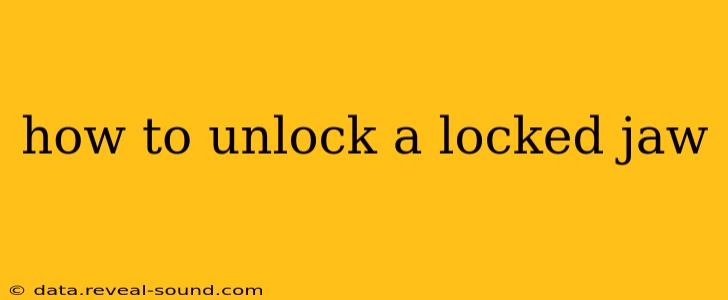A "locked jaw," more accurately termed temporomandibular joint (TMJ) dysfunction or disorder, is a frustrating and sometimes painful condition affecting the jaw joint. It's characterized by limited jaw movement, often making it difficult to open your mouth fully or even chew. This article explores the causes, symptoms, and various ways to unlock a locked jaw, emphasizing that self-treatment should be approached cautiously and professional help is often necessary.
What Causes a Locked Jaw?
TMJ disorders arise from a complex interplay of factors. Understanding the root cause is crucial for effective treatment. Common causes include:
- Trauma: A blow to the jaw, a fall, or even a dental procedure can injure the TMJ, leading to inflammation and locking.
- Arthritis: Osteoarthritis and rheumatoid arthritis can damage the joint cartilage, resulting in limited mobility and pain.
- Dislocation: The jaw can dislocate, causing it to "lock" in a misaligned position. This often occurs due to yawning widely or eating something unusually tough.
- Muscle spasms: Stress, teeth grinding (bruxism), and clenching can lead to muscle spasms that restrict jaw movement.
- Structural issues: In some cases, anatomical variations in the jawbone or joint structure can contribute to TMJ disorders.
How Do I Know If My Jaw Is Locked?
Recognizing the signs of a locked jaw is essential for seeking timely treatment. Symptoms can vary in severity, but common indicators include:
- Limited jaw opening: Difficulty opening your mouth wide enough to eat or speak comfortably.
- Jaw pain: Aching, throbbing, or sharp pain in the jaw joint, temples, or face.
- Clicking or popping sounds: Noises emanating from the jaw joint during movement.
- Facial pain: Pain radiating to the ears, temples, or neck.
- Headaches: Frequent or persistent headaches, particularly in the temporal area.
What Are Home Remedies for a Locked Jaw?
While home remedies can provide temporary relief from mild TMJ symptoms, they are not a replacement for professional diagnosis and treatment. Some options include:
- Gentle jaw stretches: Carefully perform gentle stretches to improve jaw mobility. Consult a physical therapist for guidance on appropriate exercises.
- Heat or cold packs: Applying warm or cold compresses to the affected area can reduce pain and inflammation. Experiment to determine which works better for you.
- Over-the-counter pain relievers: Ibuprofen or acetaminophen can help manage pain and inflammation. Always follow the recommended dosage.
- Stress management techniques: Practicing relaxation techniques like yoga, meditation, or deep breathing can help reduce muscle tension and spasms.
When Should I See a Doctor About a Locked Jaw?
It’s crucial to seek professional medical attention if:
- Your jaw is significantly limited in its range of motion.
- You experience severe pain or swelling.
- Symptoms persist for more than a few days.
- You suspect a possible dislocation.
What Treatments Are Available for a Locked Jaw?
Treatment for TMJ disorders depends on the underlying cause and severity of the symptoms. Your doctor or dentist may recommend:
- Medications: Pain relievers, muscle relaxants, or anti-inflammatory drugs.
- Physical therapy: Exercises and stretches designed to improve jaw mobility and reduce muscle tension.
- Splints or mouthguards: These devices help to realign the jaw and protect the teeth from grinding.
- Surgery: In rare cases, surgery may be necessary to correct structural problems or repair damage to the joint.
Can a Chiropractor Help with a Locked Jaw?
Some chiropractors treat TMJ disorders, using techniques like spinal manipulation and soft tissue mobilization to address jaw joint misalignments and muscle imbalances. However, it's essential to consult a qualified healthcare professional who specializes in TMJ disorders to determine if chiropractic care is appropriate for your situation.
How Long Does it Take to Unlock a Locked Jaw?
The recovery time for a locked jaw varies significantly depending on the underlying cause and the chosen treatment plan. Mild cases may resolve within a few days or weeks with conservative management, while more severe cases may require several months or even longer to heal fully.
How Can I Prevent a Locked Jaw?
Prevention focuses on reducing the risk factors that contribute to TMJ disorders. Consider these strategies:
- Maintain good posture: Proper posture reduces strain on the jaw and neck muscles.
- Manage stress effectively: Stress reduction techniques can minimize muscle tension.
- Avoid excessive yawning or chewing: Limit activities that could put excessive strain on the jaw joint.
- Practice good oral hygiene: Regular dental checkups can help identify and address potential problems early.
Remember, this information is for general knowledge and does not constitute medical advice. Always consult with a qualified healthcare professional for diagnosis and treatment of any medical condition.
